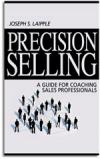Arming Sales Managers for Success
Sales people spend more time with their customers than their bosses. If we leave customer behavior out of the equation, we are ignoring reality. This missing element contributes to the often heard boast of the ineffective sales person: “That call went well. I was able to tell them about my product (or service)”. When asked how the customer responded, these sales people say “not sure, but I was able to say what I wanted to say.” Most sales processes leave out the most critical element that ensures success: the behavior of the customer. The best sales people are keen observers of what customers say and do. They are also effective analyzers of what they need to say and do to move customer responses along the sales continuum. Most selling, regardless of an organization's sales process, are about the same: a little planning, an opening, a closing, and some post-work. In between, the sales person asks a few questions, (hopefully) listens, identifies needs, shares benefits, anticipates and overcomes objections.
The failure of a sales process is found in what most lack: fully exploring the power and impact of customer behavior and responses. Sales managers interested in helping sales people be successful can support them by asking sales people what they want their customers to say and do and then helping them revise their sales plan to address these answers to customer behavior. A particularly frequent way to help is simply encouraging sales people to develop a brief contingency plan for if they strike out with their initial plan. Reviewing what the customer said and did and connecting that to what the sales person did to get that response goes a long way towards positioning the sales manager as a coach and as someone who helps sales people be successful. It also redefines that coaching conversations to what they together want to happen rather than make it about an abstract ideal in an incomplete sales process. Sales people improve what they do for the customer and not merely because the boss wants or tells them to do something. Sales people spend most of their time with customers anyway. Why not put customers to work for you in a way that helps develop and improve your sales force.




